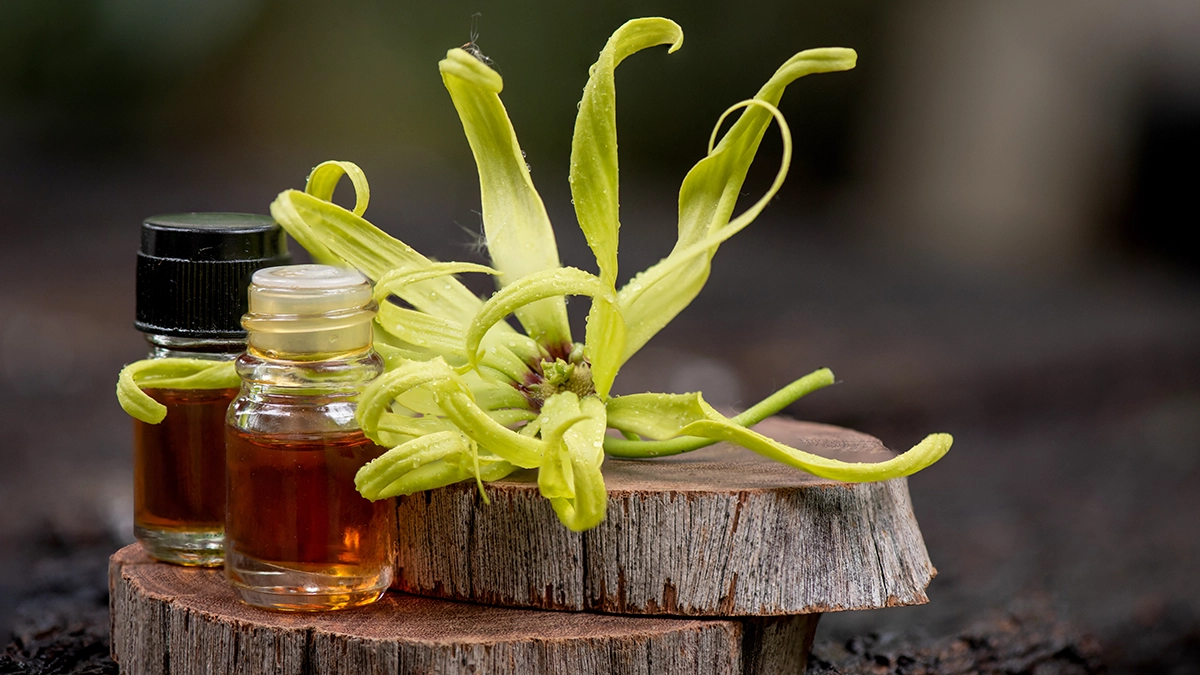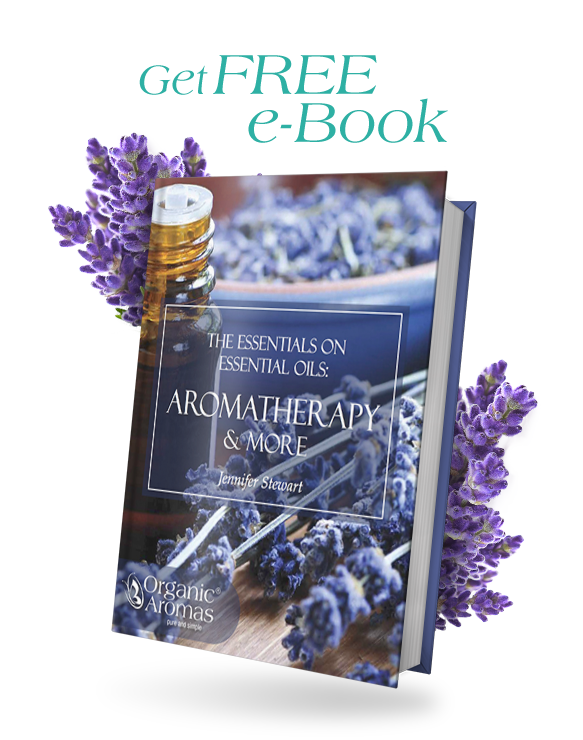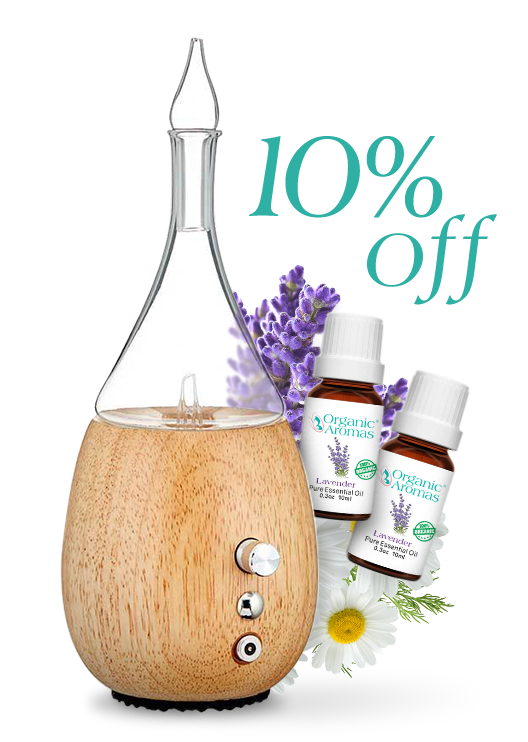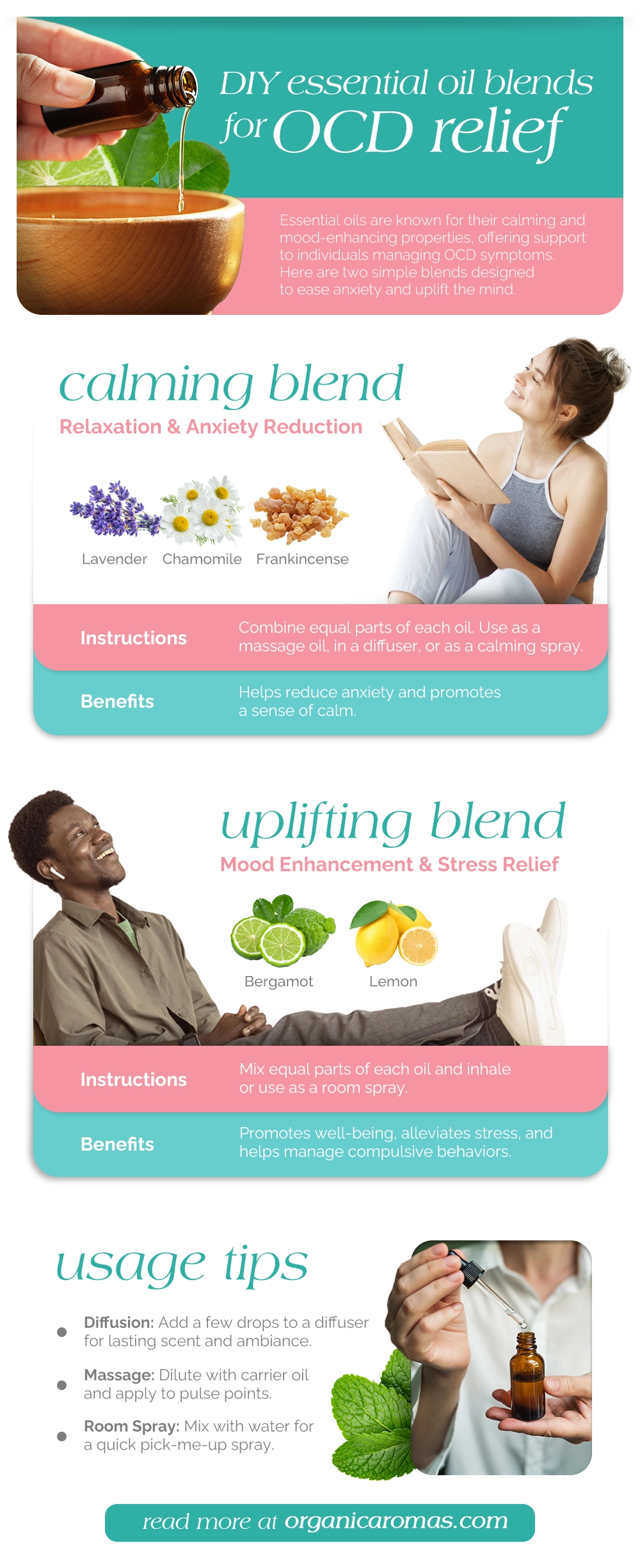Top Essential Oils for Obsessive Compulsive Disorder: Natural Remedies for Better Balance
Can essential oils for obsessive compulsive disorder help manage obsessive-compulsive disorder (OCD) symptoms? Imagine finding a natural remedy that could help you reclaim your peace of mind and improve your daily life. This article explores how specific essential oils may offer natural support in reducing anxiety and improving emotional balance for individuals with OCD. We will discuss the benefits, usage methods, and top oils to consider.
Must-Know Insights for Managing OCD with Essential Oils
Understanding OCD and Its Symptoms

Obsessive-compulsive disorder, commonly known as OCD, is characterized by intrusive thoughts and repetitive behaviors that can feel overwhelming and uncontrollable. These obsessions are persistent, unwanted thoughts, while compulsions are repetitive actions performed to alleviate the distress caused by these thoughts.
Despite recognizing that their compulsive behaviors are excessive, individuals with OCD often feel powerless to stop them. The onset of OCD symptoms typically occurs in late childhood to early adulthood and can vary in intensity over time. Stressful periods often exacerbate symptoms, making it even more challenging for individuals to manage their daily lives.
The impact of OCD can be profound, disrupting daily routines and affecting one’s ability to perform everyday tasks. Recognizing these symptoms helps in identifying effective management strategies, including natural remedies like essential oils.
How Essential Oils Can Support OCD Management

Essential oils have gained traction as complementary therapies for various mental health conditions, including OCD. These oils can help calm the nervous system, which is essential for individuals experiencing OCD. Essential oils promote relaxation and reduce anxiety, offering significant support for managing OCD symptoms.
Specific essential oils, like lavender and bergamot, are known to have mood-enhancing properties and can aid in reducing obsessive thoughts and compulsive behaviors. Incorporating these oils into mindfulness practices can amplify their calming effects, offering a natural way to improve overall well-being.
Additionally, essential oils benefit the central nervous system without the typical side effects of pharmacological treatments. This makes them a valuable addition to a holistic approach to OCD management.

Sign Up to Get Your FREE
e-Book Here…
Essential Oils for Obsessive-Compulsive Disorder (OCD): Scientific Evidence
Essential oils are increasingly being explored as complementary therapies for various mental health conditions, including obsessive-compulsive disorder (OCD). OCD is a chronic condition characterized by intrusive thoughts (obsessions) and repetitive behaviors (compulsions). Conventional treatments include cognitive-behavioral therapy (CBT) and medications, but some patients seek alternative therapies such as essential oils to help manage their symptoms.
Evidence:
- Anxiolytic Effects of Citrus Essential Oil:
- A study on mice demonstrated that the essential oil from Citrus aurantium L. (bitter orange) has significant anxiolytic effects. The research used the marble-burying test, an animal model of obsessive-compulsive behavior. The essential oil was found to suppress this compulsive behavior without impairing motor functions, suggesting its potential use in reducing compulsive behaviors in OCD (Pultrini et al., 2006).
- Modulation of Neurotransmitter Systems:
- Essential oils have been shown to influence neurotransmitter systems, particularly those associated with anxiety and compulsive behaviors. Lavender (Lavandula angustifolia) and bitter orange (Citrus aurantium) essential oils have exhibited anxiolytic-like effects by modulating the GABAergic system, which plays a critical role in anxiety regulation. These oils might offer a complementary approach to traditional OCD treatments by reducing anxiety symptoms that often co-occur with OCD (Lizarraga-Valderrama, 2020) and (Wang & Heinbockel, 2018).
- Potential Antidepressant Properties:
- Depression is often comorbid with OCD. Essential oils such as lavender have been found to have antidepressant effects, which might help improve the overall mental state of individuals with OCD. These oils can regulate neurotransmitter levels and hormones, which are often imbalanced in depression and OCD, suggesting a broader application for mood stabilization (Liang et al., 2021).
- Mechanistic Insights and Safety:
- Studies have highlighted that essential oils, through inhalation or topical application, can enter the bloodstream and influence brain activity by modulating neurotransmitters and brain wave patterns. This method of delivery suggests that essential oils could exert effects on mental health without the adverse effects commonly associated with pharmacological treatments. However, further clinical trials are necessary to confirm these effects in humans with OCD (Perry & Perry, 2006).
Top Essential Oils for Managing OCD Symptoms

Various essential oils have been identified as particularly effective in managing OCD symptoms. These include lavender, frankincense, chamomile, bergamot, and ylang-ylang. Each of these oils offers unique benefits that can help alleviate anxiety, reduce compulsive behaviors, and promote emotional stability.
Each of these essential oils offers unique benefits for managing OCD symptoms.
Lavender Essential Oil
Lavender essential oil is renowned for its soothing and sedative properties, making it one of the best essential oils for managing OCD. It significantly reduces feelings of anxiety and stress, which are common challenges for those with OCD. Additionally, lavender oil improves sleep quality, which can be particularly beneficial for individuals whose OCD symptoms disrupt their rest.
Lavender essential oil’s calming properties make it valuable for a holistic approach to OCD. It promotes relaxation, enhances mood, and helps create a more balanced and peaceful state of mind.
Frankincense Essential Oil
Frankincense essential oil is another powerful ally in the fight against OCD. Known for its ability to alleviate stress and promote relaxation, frankincense oil can help reduce anxiety levels and create a calm environment. Inhalation of frankincense essential oil can decrease feelings of frustration, which is often experienced by those with OCD.
Moreover, frankincense oil enhances mental clarity and focus, aiding individuals in managing intrusive thoughts more effectively. Its properties contribute to emotional balance, stabilizing mood and reducing negative emotional states.

Join Now and Get a Coupon for 10% Off!
Chamomile Essential Oil
Chamomile essential oil is well-known for its calming properties, making it an excellent choice for those dealing with OCD. It helps ease obsessive thoughts and reduces anxiety and stress, which are significant challenges for individuals with OCD. Additionally, chamomile oil has anti-inflammatory and antispasmodic properties that benefit overall mental health.
Chamomile essential oil can be integrated into an OCD management routine to provide natural support alongside other therapies. Its sedative properties promote relaxation and better sleep.
Bergamot Essential Oil
Bergamot essential oil is effective in mitigating compulsive behaviors and enhancing overall emotional well-being. It has been shown to lower cortisol levels, which can help in reducing stress and improving emotional stability. An uplifting blend of bergamot and lemon essential oils is known to enhance mood and reduce feelings of stress.
Incorporating bergamot oil into a daily routine can significantly improve mood and reduce stress-related symptoms for individuals with OCD.
Ylang Ylang Essential Oil
Ylang-ylang essential oil is known for its ability to reduce stress levels and increase calmness. It promotes relaxation, reduces tension, and calms the mind, making it beneficial for individuals with OCD. Although more research is needed specifically on its effects on OCD, ylang-ylang oil is promising for its general calming and anxiety-reducing properties.
Ylang-ylang oil can be added to an OCD management plan to promote relaxation and reduce anxiety levels.
Methods to Use Essential Oils for OCD

Essential oils can be effectively integrated into daily routines through various methods such as diffusion, topical application, and baths. A nebulizing diffuser from Organic Aromas can set the day’s tone, providing grounding and clarity with strong, pure, and natural fragrances.
Mix essential oils with a carrier oil like coconut or jojoba oil to prevent skin reactions when applying them topically. A few drops of essential oils diluted in a carrier oil is essential to minimize skin irritation, with general guidelines suggesting a dilution of 1-2%. A patch test before full application ensures there are no allergic reactions.
Begin with a small amount of essential oil and gradually increase as tolerated to assess its effectiveness and suitability. Avoid direct sunlight on areas where photosensitizing oils have been applied to prevent irritation.
DIY Essential Oil Blends for OCD Relief
DIY essential oil blends support relaxation and emotional balance, benefiting those managing OCD symptoms.
Here are some specific blends designed to promote relaxation and enhance mood.
Calming Blend Recipe
To create a calming blend, combine lavender, chamomile, and frankincense essential oils. Lavender oil alleviates anxiety with its calming properties, while chamomile oil relaxes the mind and reduces tension.
Frankincense oil stabilizes mood and enhances relaxation. This blend promotes relaxation and reduces anxiety, offering a natural remedy for managing OCD symptoms.
Uplifting Blend Recipe
An uplifting blend with bergamot and lemon oils enhances mood and reduces stress, recognized for their mood-enhancing effects.
Combine appropriate amounts of bergamot and lemon essential oils to create an uplifting blend. This mixture promotes well-being and boosts mood, naturally alleviating stress and compulsive behaviors.

The Role of Professional Help in OCD Management
Although essential oils are valuable in a holistic approach to managing OCD, they should not replace professional help. A children’s mental health expert can provide a comprehensive assessment and create an individualized treatment plan tailored to the specific needs of the individual.
Conventional treatments for OCD often include cognitive-behavioral therapy (CBT) and medications prescribed by qualified healthcare providers. Essential oils primarily aid in managing anxiety and stress associated with OCD rather than addressing the root causes of the disorder.
Support groups and therapy sessions complement essential oils, enhancing recovery by connecting individuals with similar challenges. Early treatment of OCD with a holistic approach combines essential oils and evidence-based treatments like exposure and response prevention (ERP) therapy.

Join Our Exclusive Member Club to get Big Discounts!
Summary
Essential oils offer a natural and complementary approach to managing OCD symptoms. Oils like lavender, frankincense, chamomile, bergamot, and ylang-ylang can promote relaxation, reduce anxiety, and improve mood, providing valuable support for those dealing with OCD.
While these natural remedies are beneficial, they should be used alongside professional treatments and therapies. By integrating essential oils into a comprehensive treatment plan, individuals can find better balance and improved well-being.
Frequently Asked Questions
How do essential oils help with OCD?
Essential oils can effectively calm the nervous system and reduce anxiety, thereby aiding in the management of OCD symptoms. Incorporating them into your routine may promote relaxation and enhance your overall well-being.
What are the best essential oils for OCD?
Lavender, frankincense, chamomile, bergamot, and ylang-ylang are the most effective essential oils for managing OCD symptoms. Incorporating these oils into your routine may provide relief and support your well-being.
Can essential oils replace conventional OCD treatments?
Essential oils cannot replace conventional OCD treatments such as cognitive behavioral therapy and medications, but they may serve as a complementary approach to enhance overall well-being. Prioritizing evidence-based treatments is crucial for effective management.
How should essential oils be used for OCD?
Essential oils should be used for OCD through diffusion, topical application with a diluted carrier oil, or in baths, ensuring proper dilution to prevent skin irritation. This method can help create a calming environment that may alleviate symptoms.
Are there any DIY essential oil blends for OCD relief?
Yes, consider a calming blend of lavender, chamomile, and frankincense, or an uplifting blend of bergamot and lemon for OCD relief. These essential oils can support relaxation and elevate mood.








I’m obsessive about using my nebulizer.